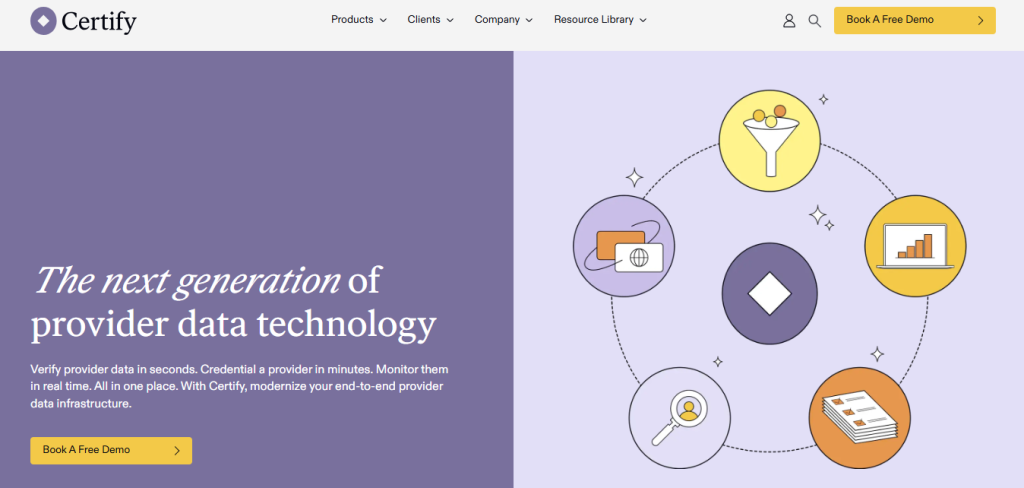Certify Raises $40M in Series B to Reshape Healthcare Credentialing and Compliance
July 6, 2025
byFenoms Startup Research

Certify, a fast-growing healthtech startup, has secured $40 million in Series B funding, cementing its position as a category leader in healthcare workforce compliance and credentialing. The round was led by major institutional backers including Transformation Capital, General Catalyst, Upfront Ventures, and SemperVirens, reflecting strong market confidence in the company’s vision.
The announcement was made by Anshul Rathi, the company’s co-founder and CEO, who has been at the forefront of transforming how healthcare organizations manage the complexity of compliance, licensure, onboarding, and workforce readiness.
Solving a Silent Crisis in Healthcare Administration
Behind every nurse, therapist, or physician is a complex, often inefficient process of credential verification, license tracking, background checks, and compliance audits. For hospitals and staffing agencies, the paperwork burden is massive - and mistakes can cost both time and accreditation.
Certify provides an automated platform that centralizes every aspect of healthcare credentialing: license verification, compliance reporting, continuing education tracking, and onboarding workflows. It eliminates the fragmented Excel sheets, email chains, and manual errors that plague healthcare HR teams.
According to Rathi, “Our goal is to make healthcare credentialing invisible, seamless, and always up-to-date - so frontline professionals can focus on patient care, not paperwork.”
From Workflow Chaos to Trust Infrastructure
The $40 million raise will be used to enhance Certify’s product, expand engineering and sales teams, and scale across more hospital systems and staffing partners in the U.S. market. The platform already serves hundreds of healthcare organizations, and the new capital is expected to help Certify triple its customer base in the next 12–18 months.
But this isn’t just about digitizing processes or removing friction.
Here’s what founders should really pay attention to:
In regulated verticals like healthcare, the highest-leverage startups don’t build tooling around compliance - they become the compliance. Certify isn’t just enabling hospitals to meet standards faster; it’s shaping what those standards look like in practice. That’s how a product becomes a protocol.
When your platform becomes embedded in the day-to-day legal, operational, and audit cycles of an industry, you’re no longer optional software - you’re the system of record. That’s a moat you don’t advertise… until it’s too late for competitors to replicate.
This strategic depth is what makes companies like Certify not just workflow solutions, but infrastructure bets - and why top-tier investors are doubling down.
Backing From Healthcare’s Smartest Capital
Certify’s Series B round was led by some of the most respected names in healthtech and B2B SaaS:
- Transformation Capital: A leading healthcare-focused growth equity firm.
- General Catalyst: Known for investing in cutting-edge healthcare infrastructure (e.g., Olive AI, Commure).
- Upfront Ventures and SemperVirens: Firms with strong track records in workforce tech and regulatory innovation.
The round validates Certify’s market thesis: that healthcare institutions desperately need modern tooling to keep up with growing workforce demands, especially amid post-pandemic labor shortages and evolving compliance standards. Why This Market Is Ripe for Disruption
The U.S. healthcare market is projected to reach $6.8 trillion by 2030, according to CMS data, driven by an aging population, rising chronic illness, and expanded access to care. However, administrative inefficiency is eating into those dollars - roughly 25% of U.S. healthcare spending is wasted, and credentialing delays play a significant role.
Meanwhile, the American Hospital Association reports that nearly 40% of HR departments cite credentialing as one of their top three operational pain points. These delays often stretch to 30–60 days per clinician, creating backlogs that directly impact staffing ratios, patient care, and compliance exposure.
The situation is compounded by the healthcare labor crisis: Mercer forecasts a 3.2 million healthcare worker shortfall by 2026, especially in nursing and allied health. At a time when systems desperately need speed and flexibility in hiring, manual credentialing remains a critical drag on operational agility.
Certify’s ability to automate, track, and verify licenses in real time directly tackles this crisis - turning paperwork bottlenecks into on-demand workflows.
Anshul Rathi: Building the Trust Layer for Healthcare Labor
CEO Anshul Rathi founded Certify after seeing credentialing chaos firsthand while working with staffing firms. His background in enterprise SaaS gave him the insight to see credentialing not just as a task to optimize - but as a core trust mechanism in healthcare hiring.
That framing has shaped everything from product to go-to-market strategy. Certify isn’t selling speed - it’s selling certainty. Hospitals don’t just get faster workflows - they get defensible compliance, trusted audits, and confident onboarding.
The Vision Behind the Founder
Anshul Rathi, a former product leader with experience in enterprise SaaS and digital operations, founded Certify after witnessing the credentialing chaos while working with healthcare staffing agencies. His product-first mindset combined with real-world pain points has allowed the company to grow rapidly, with a culture rooted in speed, security, and service.
Rathi’s vision is not just to digitize compliance, but to redefine trust in the healthcare labor ecosystem - making it faster, safer, and more transparent to hire qualified professionals across state lines, job functions, and care settings.
What’s Next for Certify?
With this latest round of funding, Certify is focused on several key expansion tracks:
- AI-based license intelligence and auto-renewal systems
- Multi-state compact license integration for mobile healthcare workers
- Real-time dashboards for compliance teams and regulators
- Deeper integrations with EHRs and workforce management tools
As healthcare becomes increasingly decentralized - with traveling clinicians, remote consults, and multi-state telehealth - the ability to verify, track, and audit credentials in real time is no longer optional.
Certify is building for that future - where trust isn’t assumed, it’s verified continuously, in code.









